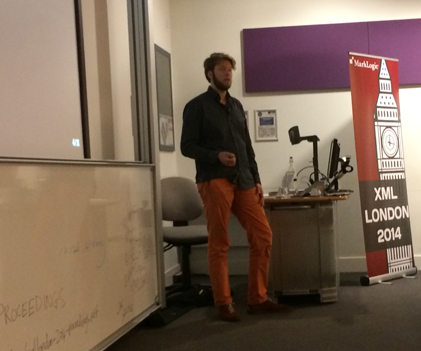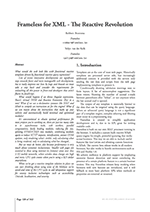

Frameless for XML - The Reactive Revolution
Robbert Broersma (Frameless)
Abstract
What would the web look like with functional reactive templates driven by functional reactive query expressions?
Lots of recent innovative developments are significant steps towards faster and more manageable web development, but to really improve our lives by leaps and bounds we must take a step back and consider the requirements for unleashing all this power to front-end developers that aren't fluent in JavaScript.
What would happen if we throw Angular expressions, React's virtual DOM and Reactive Extensions (Rx) in a mix? What if we use a declarative syntaxes like XSLT and XPath to compile an instruction set for this engine? What if we can reason about the instructions that make up your website and automatically build minimal and optimized modules?
It's uneconomical to obtain optimal performance for most projects you're working on, there are just too many sides to it: asynchronous tasks, web workers, parallel computations, lazily loading modules, reducing file size, splitting HTML/CSS/JS into modules, combining modules again to reduce HTTP requests, minification, atomic DOM updates, only rendering what's visible, only calculating what is being rendered, only re-calculating what has changed...
But we must do better, also because performance is very much about economic inclusiveness. Smaller web pages are essential to those using internet in (remote) areas over slow 2.5G mobile networks, where wireless data charges are high and every CPU cycle counts when you're using a $25 dollar smartphone.
When we've got a reactive template solution in place we can start thinking about using some of the kilobytes we've saved and some of the CPU cycles to add ubiquitous support for unsexy inclusive technologies such as accessibility, Unicode, localization, and security.
How to cite this
Robbert Broersma and Yolijn van der Kolk. "Frameless for XML - The Reactive Revolution"
Presented at XML London 2014, June 7-8th, 2014.
doi:10.14337/XMLLondon14.Broersma01.


